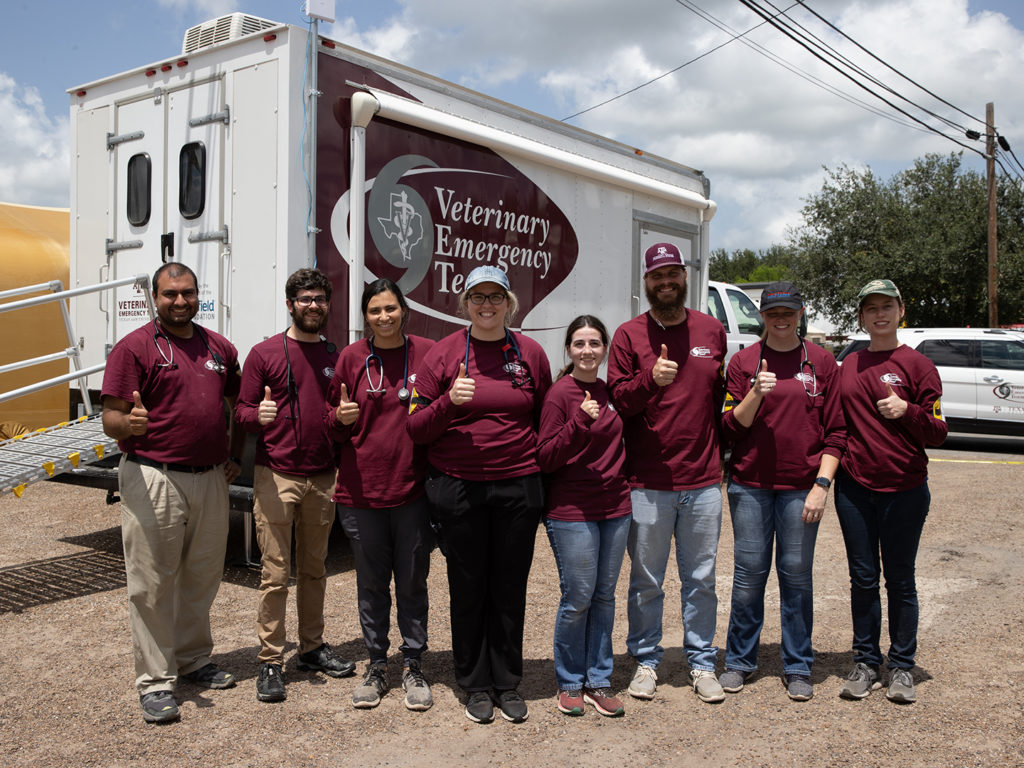Texas A&M Veterinary Students Among First To Receive New AVMA Certification
Story by Aubrey Bloom, CVMBS Communications

One hundred-twenty graduates of the Texas A&M College of Veterinary Medicine & Biomedical Sciences (CVMBS) are among the first veterinarians in the country eligible to receive a new certification from the American Veterinary Medical Association (AVMA).
The AVMA Veterinary First Responder Certificate will certify veterinarians who are trained to assist in disaster situations.
The first online courses for practicing veterinarians to begin working toward the certificate were recently released by the AVMA. Once they’re all released, veterinarians will combine those with courses available through the Federal Emergency Management Agency’s (FEMA) Independent Study Program to satisfy the core competencies and earn their certification.
Dr. Warren Hess, an assistant director in the AVMA Division of Animal and Public Health who oversees the program, said this certification has been needed for some time.
“There is a lot of excitement in the animal disaster community for this program,” he said. “While it may take some time before there is a larger number of courses, the excitement comes from the fact that there is finally a standard for veterinary responders.”
The AVMA also approved the Texas A&M Veterinary Emergency Team’s (VET) fourth-year clinical rotation, “VET Emergency Management,” as part of the certificate program. The rotation satisfies most of the core competencies, with the remaining competencies being covered earlier in the Texas A&M veterinary curriculum. The approval is also retroactive to the beginning of last academic year.
As a result, the 120 students who completed the rotation in the last year met requirements for the new certificate as soon as they graduated from the Doctor of Veterinary Medicine (DVM) program on May 11.
The only other veterinarians immediately eligible for the certificate are ones who currently serve in first responder roles or that teach, or previously taught, AVMA approved courses. That group includes Dr. Wesley Bissett, VET director, and Dr. Deb Zoran, VET member and CVMBS professor of small animal clinical sciences.
“This is definitely a much-needed certification from the AVMA,” Bissett said. “It’s one thing to want to help, but certifying veterinarians who know how to help and have that training to know how to correctly integrate with other responders will be a major asset in emergency situations.”
During the two-week VET rotation at Texas A&M, students get experience in both preparing for and responding to emergency situations.
This includes training in disaster medicine and response; on the importance of record keeping, personal preparedness, and practice preparedness; and on how to assist communities with emergency planning.
During most rotations, the students work with county officials across Texas to help a county develop emergency operations plans, but if the VET is activated during the rotation, students deploy with the team and get first-hand experience in disaster response. Earlier this year, a group of students was deployed with the team to Eastland County in response to wildfires.
A few times a year, students also work with feedlot operators in the Texas Panhandle to develop biosecurity plans that will help the feedlots continue operations even in the case of an infectious disease outbreak.
Zoran said the approval is a recognition of how effectively the rotation trains students to be able to respond in emergencies.
“When your practice or your community is in an emergency situation, you want to be able to help, but it’s incredibly difficult to integrate into the disaster response systems if you aren’t already familiar with them,” she said. “Having this certification will show that our students graduate with that critical training.”
###
For more information about the Texas A&M College of Veterinary Medicine & Biomedical Sciences, please visit our website at vetmed.tamu.edu or join us on Facebook, Instagram, and Twitter.
Contact Information: Jennifer Gauntt, Director of VMBS Communications, Texas A&M College of Veterinary Medicine & Biomedical Sciences, jgauntt@cvm.tamu.edu, 979-862-4216


